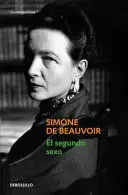
DE BEAUVOIR, SIMONE
u003cbu003eEs una de las obras fundacionales del Feminismo y utiliza los conceptos existencialistas para indagar acerca de la vida de la mitad de la humanidad.u003c/bu003eu003cbru003e u003cbu003e u003c/bu003eu003cbru003e u003cbu003eu003ciu003eEl segundo sexou003c/iu003e es considerado hoy la "Biblia del feminismo", la obra de referencia, especialmente de la corriente denominada "feminismo de la igualdad".u003c/bu003eu003cbru003e u003cbu003e u003c/bu003eu003cbru003e No sólo es considerado uno de los libros más relevantes del siglo XX, sino que tras su publicación fue un rotundo éxito de ventas.u003cbru003e u003cbru003e u003ciu003eEl segundo sexou003c/iu003e fue escrito en 1949 por Simone de Beauvoir, quien comenzó a prepararlo cuando reflexionó, a propuesta de Jean-Paul Sartre, sobre lo que había significado para ella el ser mujer.u003cbru003e u003cbru003e Esta idea la llevaría a investigar acerca de la situación de las mujeres a lo largo de la historia y a escribir este extenso ensayo que aborda cómo se ha concebido a la mujer, qué situaciones viven las mujeres y cómo se puede intentar que mejoren sus vidas y se amplíen sus libertades.u003cbru003e u003cbru003e Es una de las obras fundacionales del Feminismo y utiliza los conceptos existencialistas para indagar acerca de la vida de la mitad de la humanidad. También es considerada una obra enciclopédica, pues aborda su tema desde los puntos de vista de la psicología, la historia, la antropología, la biología, la reproducción y las relaciones afectivo-sexuales.u003cbru003e u003cbru003e La teoría principal que sostiene Beauvoir es que la mujer, o más exactamente lo que entendemos por "mujer" (coqueta, frívola, caprichosa, salvaje, etc.) es un producto cultural que se ha construido socialmente. La mujer se ha definido a lo largo de la historia siempre respecto a algo: como madre, esposa, hija, hermana... Así pues, su principal tarea es reconquistar su propia identidad específica y desde sus propios criterios.u003cbru003e u003cbru003e u003cbu003eENGLISH DESCRIPTIONu003c/bu003eu003cbru003e u003cbru003e u003cbu003eVital and groundbreaking, this is one of feminism's founding works. It inquires and examines the life of one half of humanity by using existentialist concepts.u003c/bu003eu003cbru003e u003cbu003e u003c/bu003eu003cbru003e u003cbu003eu003ciu003eThe Second Sexu003c/iu003e today is considered the "Bible of feminism", the most important work of reference, especially for the "feminism for equality" movement.u003c/bu003eu003cbru003e u003cbru003e Seventy years after its initial publication, u003ciu003eThe Second Sexu003c/iu003e is still as eye-opening and pertinent as ever and is considered one of the most important books of the twentieth century. Simone de Beauvoir began to write it in 1949 when she reflected, on Jean-Paul Sartre's proposal, on what it meant for her to be a woman.u003cbru003e u003cbru003e This idea would lead her to explore and study about women's roles throughout history and to write this extensive essay that examines how women were perceived, what situations they live through, and how we can help them improve their lives and increase their freedoms.u003cbru003e u003cbru003e Beauvoir's main theory is that women, or what we understand by "women" (flirtatious, frivolous, erratic, wild, etc.) is a cultural product that has been fabricated by society. Women have always defined themselves with respect to something: as a mother, as a wife, as a daughter, or sister . . . So, her main task should now be to regain her own identity by making up her own principles and standards.